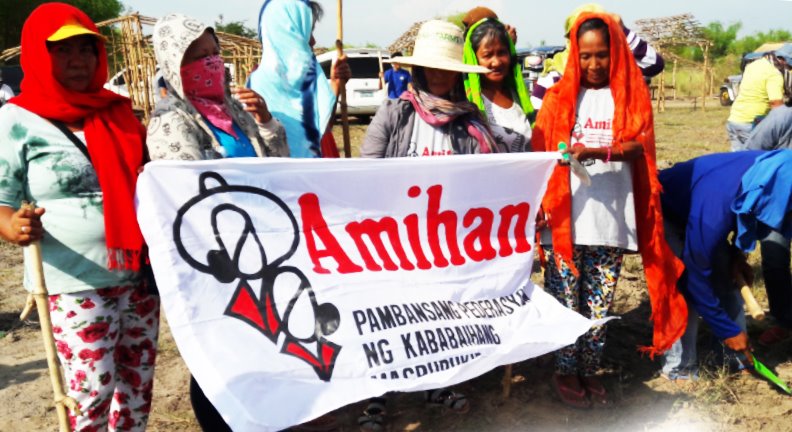This March 8 #IWD2020, Amihan will join the nationally-coordinated protest and the Women’s Global Strike to advance the peasant women’s call for land, food and justice and resisting the neoliberal and liberalization of agriculture policies of the Duterte government. Here are the reasons why we must support the peasant women in the countryside.
a. Peasant women are landless and victims of social injustice
The country remains agricultural and agrarian, where the lands are monopoly-controlled by the rich and elite few hacienderos and compradors (local partners of foreign investors), such as in the cases of Hacienda Luisita in Tarlac, sugar lands in Negros, rice lands in Nueva Ecija and Central Luzon, coconut lands in Southern Tagalog and Bicol, and plantations in Mindanao.
Working on these lands are poor peasants, including women, who remain engrossed in landlessness, unimaginable poverty, hunger and misery. Their state is worsened by the systematic displacement brought about by land grabbing, land use conversion and other government-sponsored programs and projects.
The government carries out neoliberal policies by worsening the export-orientation of the economy and sector, by allotting thousands of hectares of lands for plantations owned by foreign agro-corporations or destructive mining and other economic activities at the cost of displacing peasant communities. Likewise, by liberalization of agriculture, it promotes importation of major agricultural products such as rice, that leads to eroding household incomes, bankruptcy, displacement from livelihood and eventual landlessness.
Strikingly, amid the peasant women compose around half of the majority sector in the country, which is the peasantry at about 75%, their contribution to society and economy is disregarded. Government data showed that wage levels received by peasant women is only 5.5% of the wages received by men, and the labor of 6 out 10 peasant women are counted as unpaid family labor in the agriculture sector.
b. Peasant women are victims of abuses, exploitation and discrimination
Peasant women are more vulnerable to abuse, rights violations, exploitation and discrimination. As of this August, extra-judicial killings victimized twenty-one (31) peasant women and five (10) children, twenty nine (29) elderly and eight (8) farmer couples, out of the total 247 victims coming from the peasant sector.
The cases of violence against lumad schools, aerial bombings and militarization in farming communities in Mindanao, Negros, Eastern Visayas, Bicol, Isabela, Nueva Ecija, Mindoro, Quezon and many other provinces in the country have subjected peasant women and children to injustice, agony and misery. Government forces who usually occupy civilian establishments such as barangay halls, daycare center, house-to-house operations, usually perpetrate these abuses.
Militarization in the country has triggered mass trauma, affecting the psychological and physical health of peasant women and children. This has generated abuses such as threats, rape, sexual harassment and consistent with military presence in communities.
Backward rural tradition also disregards the opinion of peasant women in decision-making, management and inheritance of farm lands are usually endowed to male members of the family, and they are limited to domestic concerns.
c. Peasant women are victims of poverty and hunger, and advocates of food security and genuine agrarian reform
Neoliberal policies and liberalization of agriculture are undermining food security in the country. Peasant women are on the frontline of facing hunger as they tussle for means to feed their children. Foods are scarce as vast tracks of lands are devoted to cash crops, under the export-orientation of agriculture. In turn, local hacienderos, compradors and their foreign counterparts, reap the fruits of labor in agriculture in forms of profits, at the expense of the peasant masses being subjected to inhumane conditions of poverty and hunger.
Mounting rice imports are also threatening the capacity of the country to produce food for the people. Government agencies, instead of working to develop agriculture are promoting importing of cheap foreign-sourced agricultural products that dislocates local producers. As cry, the peasant women movement is calling for a stop to rice importation, instead realize genuine agrarian reform in the country and for government,support for agricultural production, as appropriate approach to attaining food security for the people.

